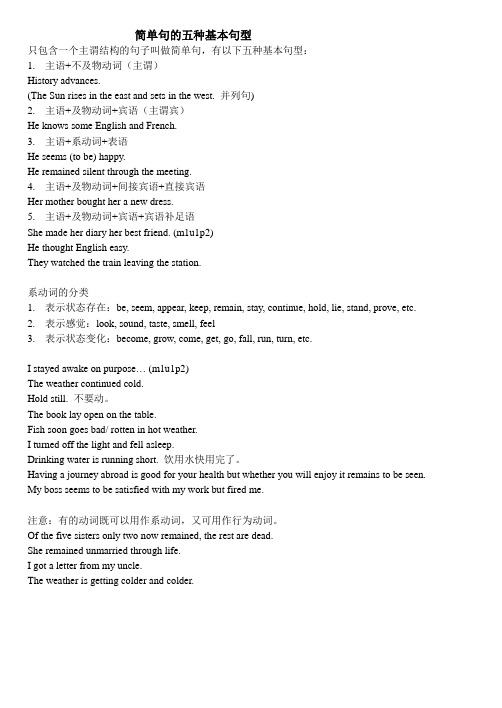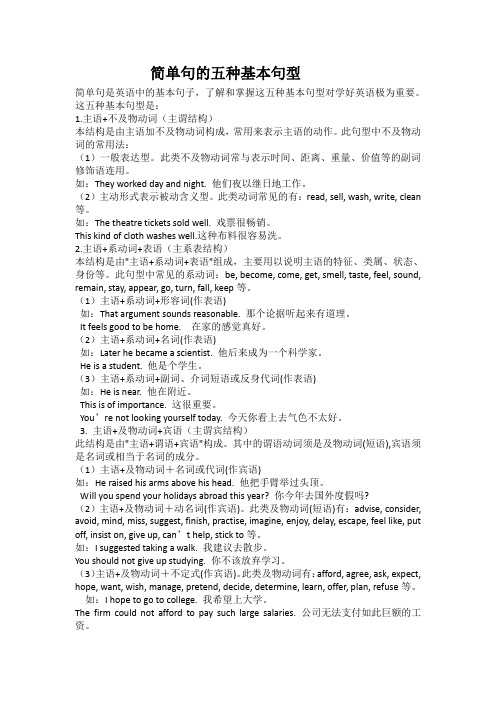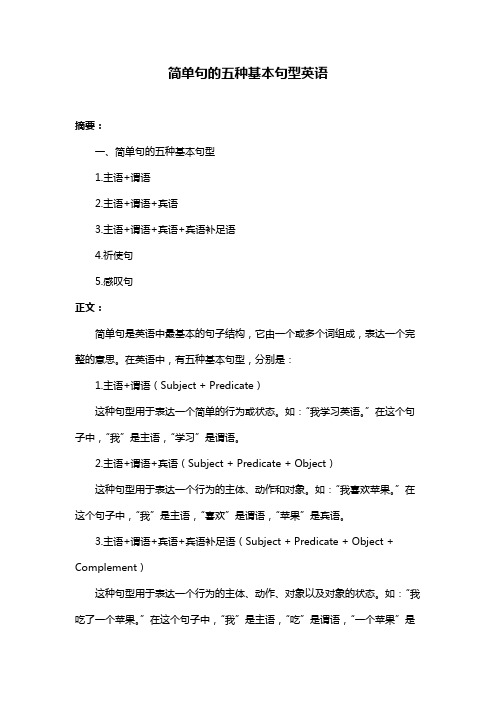简单句5个基本句型
- 格式:doc
- 大小:9.61 MB
- 文档页数:12

简单句的五种基本句型只包含一个主谓结构的句子叫做简单句,有以下五种基本句型:1.主语+不及物动词(主谓)History advances.(The Sun rises in the east and sets in the west. 并列句)2.主语+及物动词+宾语(主谓宾)He knows some English and French.3.主语+系动词+表语He seems (to be) happy.He remained silent through the meeting.4.主语+及物动词+间接宾语+直接宾语Her mother bought her a new dress.5.主语+及物动词+宾语+宾语补足语She made her diary her best friend. (m1u1p2)He thought English easy.They watched the train leaving the station.系动词的分类1.表示状态存在:be, seem, appear, keep, remain, stay, continue, hold, lie, stand, prove, etc.2.表示感觉:look, sound, taste, smell, feel3.表示状态变化:become, grow, come, get, go, fall, run, turn, etc.I stayed awake on purpose… (m1u1p2)The weather continued cold.Hold still. 不要动。
The book lay open on the table.Fish soon goes bad/ rotten in hot weather.I turned off the light and fell asleep.Drinking water is running short. 饮用水快用完了。

简单句的五种基本句型1、主语+谓语(不及物动词)2、主语+谓语(及物动词)+宾语3、主语+系动词+表语4、主语+谓语+间宾(表示人)+直宾(表示物)5、主语+谓语+宾语+宾语补足语▲主语、动词(不及物动词、及物动词、系动词)、宾语及宾语补足语可以称为基本句子成分。
完整的句子一般至少包含2个基本成分,至多4个基本成分。
主语:名词、代词、The + adj、V-ing、动词不定式、从句宾语:名词、代词、The + adj、V-ing、动词不定式、从句宾补:名词、形容词、副词、V-ing、V-ed、从句等联系动词:be / feel/ taste / smell / look(感官动词)/appear /seem/(好像)become /get / grow / turn/go (变化)remain/ keep/stay(保持)等表语:名词、代词、形容词、副词、V-ing、V-ed、动词不定式、从句等主语+谓语(不及物动词)总结:这种句型常与副词、介词短语、不定式、分词等状语一起连用主语+谓语(及物动词)+宾语总结:作宾语的可以是名词、代词、不定式、-ing分词、-ed分词等接不定式作宾语的常见动词有:attempt, dare, decide, desire, expect, hope, intend, learn, need, offer, pretend, promise, refuse, want, wish接-ing分词作宾语的常见动词有:admit, advice, avoid, consider, defend, enjoy, finish, forbid, mind, miss, practise, risk, suggest, give up, can’t help主语+谓语+间宾(表示人)+直宾(表示物)总结:to:give, hand, leave, lend, offer, pass, sell, send, show, teach, tellfor:buy, choose. get, leave, make, save, sing主语+谓语+宾语+宾语补足语总结:作宾语补足语的有名词、形容词、介词短语、不定式、-ing分词、-ed分词等Eg:allow, advise, ask, beg, cause, choose, encourage, force, expect, get, hate, invite, order, warn, teach, tell, want + sb. to do sth.Eg:feel, have, hear, let, make, notice, watch, see + sb. do sth.。



简单句的五种基本句型简单句是英语中的基本句子,了解和掌握这五种基本句型对学好英语极为重要。
这五种基本句型是:1.主语+不及物动词(主谓结构)本结构是由主语加不及物动词构成,常用来表示主语的动作。
此句型中不及物动词的常用法:(1)一般表达型。
此类不及物动词常与表示时间、距离、重量、价值等的副词修饰语连用。
如:They worked day and night. 他们夜以继日地工作。
(2)主动形式表示被动含义型。
此类动词常见的有:read, sell, wash, write, clean 等。
如:The theatre tickets sold well. 戏票很畅销。
This kind of cloth washes well.这种布料很容易洗。
2.主语+系动词+表语(主系表结构)本结构是由"主语+系动词+表语"组成,主要用以说明主语的特征、类属、状态、身份等。
此句型中常见的系动词:be, become, come, get, smell, taste, feel, sound, remain, stay, appear, go, turn, fall, keep等。
(1)主语+系动词+形容词(作表语)如:That argument sounds reasonable. 那个论据听起来有道理。
It feels good to be home.在家的感觉真好。
(2)主语+系动词+名词(作表语)如:Later he became a scientist. 他后来成为一个科学家。
He is a student. 他是个学生。
(3)主语+系动词+副词、介词短语或反身代词(作表语)如:He is near. 他在附近。
This is of importance. 这很重要。
You’re not looking yourself today. 今天你看上去气色不太好。
3. 主语+及物动词+宾语(主谓宾结构)此结构是由"主语+谓语+宾语"构成。

简单句的五种基本句型英语
摘要:
一、简单句的五种基本句型
1.主语+谓语
2.主语+谓语+宾语
3.主语+谓语+宾语+宾语补足语
4.祈使句
5.感叹句
正文:
简单句是英语中最基本的句子结构,它由一个或多个词组成,表达一个完整的意思。
在英语中,有五种基本句型,分别是:
1.主语+谓语(Subject + Predicate)
这种句型用于表达一个简单的行为或状态。
如:“我学习英语。
”在这个句子中,“我”是主语,“学习”是谓语。
2.主语+谓语+宾语(Subject + Predicate + Object)
这种句型用于表达一个行为的主体、动作和对象。
如:“我喜欢苹果。
”在这个句子中,“我”是主语,“喜欢”是谓语,“苹果”是宾语。
3.主语+谓语+宾语+宾语补足语(Subject + Predicate + Object + Complement)
这种句型用于表达一个行为的主体、动作、对象以及对象的状态。
如:“我吃了一个苹果。
”在这个句子中,“我”是主语,“吃”是谓语,“一个苹果”是
宾语,“了”是宾语补足语。
4.祈使句(Imperative Sentence)
祈使句用于表达命令、请求、劝告等。
如:“请打开窗户。
”在这个句子中,没有主语,只有谓语“打开”。
5.感叹句(Exclamatory Sentence)
感叹句用于表达惊喜、惊讶、赞叹等强烈情感。
如:“多么美丽的景色!”在这个句子中,“多么”是感叹词,“美丽”的“景色”是主语和宾语。
以上就是英语简单句的五种基本句型。
五大基本句型句子的分类按结构分:简单句、并列句、复合句按用途分:陈述句(肯定和否定)、疑问句(一般、特殊、选择、反意)、祈使句、感叹句、倒装句一.简单句(核心成分:主语+谓语)(一)五种基本句型:1.S+Vi 主谓2.S+Vt+O 主谓宾3.S+Vt+Oi+Od 主谓+间接宾语(sb.)+直接宾语(sth.)S+Vt+Od+to/for+Oi4.S+Vt+O+C 主谓宾+宾补5.S+V+P 主系表(二)简单句的变化(长句结构)在句子结构不变的前提下,可以适当加入修饰成分提升句子的难度。
E.g. Birds fly.(1)改变时态:Birds will fly.(2)变否定:Birds will not fly.(3)添加形容词做定语、添加副词做方式状语Little birds fly happily.(4)添加时间、地点状语:In autumn, little birds will fly happily in the sky.二.简单陈述句的语序叙述一件事情的陈述句都是简单陈述句一个简单陈述句可以由6部分组成。
主语和谓语是核心,时间状语可以放在句首或句尾练习:将下列单词按正确的语序排列组成句子,并写在表格内。
1.sun, rises, the, red2. passed, time, quickly, very3.tell, did, not, John, manager, the, the, truth4. he, five hundred, the, necklace, spent, on, dollars5. successfully, they, carried out, plan, the6. last ,rise, the, meat, price, of, month7. at, 8:00 a.m. , class, in, schools, begins四. 综合练习(一)指出划线部分的句子成分1. The students got on the school bus.2. He handed me the newspaper.3. I will answer your question after class.4. The apples tasted sweet.5. I made my parents proud.6. It tastes good.7. He took many photos of the palaces in Beijing.8. He hates me.9. We found him a very good pupil.10. I wish you a happy New Year.(二)写出下列句子的基本句型11. She is a very beautiful lady.12. He closed the door.13. The city will become rich.14. Grandma cooked us a nice meal.15. The train is leaving.16. Time flies.17. He has fetched us some new textbooks.18. I have changed my mind.19. I sent you an e-mail.20. Teachers will make your English better.(三)选择题1. can learn how to surf the Internet safely and effectively in computer lessons.A) You B) Your C) Yours D) Yourself2. He looked at the young man and couldn’t say a word.A) friendly B) angrily C) lonely D) lovely3. Traffic jams in our city lots of questions about transport policy.A) has risen B) have risen C) have raised D) has raised4. We are very happy to learn that Mr. Lee will teach Maths this term.A) we B) our C) us D) ourselves5. The fried chicken in KFC tastes , but having too much is unhealthy.A) good B) well C) bad D) badly四. 词转(先分析句子结构)1. The ____________________________ in the right comer is Martin’s youngest aunt. (act)2. The chance to meet new people with fresh views helps encourage the ____________ of one’s mind. (develop)3. My brother has made a ___________________ to go abroad for further studies, (decide)4. Our goal is to _______________________ people’s lives through communications, (rich)5. My parents are always strict with me and what about_________________________? (you)6. Eating vegetables and doing exercise regularly will _________________ us to have a long life. (able)7. All these interesting experiments can __________________________ our knowledge. (wide)8.___________________ is more important than anything else. No one wants to lose it. (free)9. Their school is near the beach, quite similar with______________________________. (our)10. Shall we _________________the neighbours to our daughter’s birthday party? (invitation)11.We are supposed to complete all the work by tomorrow, but it is____________________. (possible)12. The wind blew over my face ____________________ and I felt so comfortable, (gentle)13.I really can’t _________________ answer that question you just asked. (possible)14.D amin was a _____________________. He usually went fishing with a boat in the lateafternoon. (fish)15.I hadn’t seen Andera for ages. When I appeared before him, he looked very __________.(surprise)16.A fter discussing for a whole day, they reached a _____________ at last. (conclude)17.T hey boy fell into the river, and a passerby heard the cry and went to _________ him.(safe)18.T hose girls enjoyed ______________________ in the party last night. (they)19.T he ______________ of his daughter in the traffic accident made him very sad. (die)20.S hanghai International Marathon and Half Marathon _____________ lots of runners eachyear. (attractive)。
简单句的五种基本类型一、一个完整的简单句由“主语部分+谓语部分”构成The man is a teacher.主语部分谓语部分He works hard.主语部分谓语部分He teaches English well.主语部分谓语部分●连系动词be (am is are was were) / seem / keep是/好象(似乎)是/保持look / feel / taste / smell / sound看/感觉/尝/闻/听起来(上去)become / turn / get / grow 变得●主要动词行为动词不及物动词laugh / smlie / look / listen及物动词see / hear / drank / eat助动词be (am / is /are / was / were)do / does / didhave / has / had辅助动词will / shall / be going to情态动词can / may / must / shall / needcould / should / would / mighthave (has) to / had better●表语:表示主语是什么(身份)或者怎么样(处于什么状态)。
由名词、形容词或相当于名词或形容词的词或短语等充当。
和连系动词一起构成谓语,也就是说: 连系动词后面的才是表语!eg.He is a boy. She is a girl. They are students. They are good.He looks / seems ill.The apple tastes nice.Trees turn green.Your idea sounds good.●什么是及物动词和不及物动词呢⑴、及物动词是后面可以直接跟宾语的动词: see / hear / drank / eat / …I saw him last week.We heard the bad news yesterday.They eat bread every day.He drank a glass of milk just now.⑵、不及物动词是后面不可以直接跟宾语的动词: laugh / smile / look / listen / …She smiled happily.They laughed loudly.(3)、如果要加宾语,就要靠一个介词来帮助:She look at the blackboard carefully.He listened to his teacher in class.They laughed at us after the match.及物动词例句:She teaches us.She teaches EnglishShe teaches us EnglishShe told me a storyHe gave me a present二、主谓双宾结构主语+谓语+间接宾语+直接宾语可以用于这种句式的动词主要有(A) buy / build / catch / cut choose / cook / find / get / keep / make / draw / doHe bought me a new bike.也可以改为for sb. 的句式He bought a new bike for me.(B) give / take / send / bring / teach / show / tell / pay / write / read / sell / lend / pass / return / throw / offer / handShe lent me a book.也可以改为to sb. 的句式She lent a book to me.三、主谓宾宾补结构主语+谓语+宾语+宾语的补足语He told me to clean my room.I saw her dancingOur teacher asks us to read English every day.可以用于这种句式的动词主要有let / make sb. do sth.ask / tell / want / allow / wish . sb. to do sth.expect / encourage / invite / teachfind / see / hear / watch / notice / feel ①sb. do sth.②sb. doing sthhelp sb. (to) do sthhope和welcome 比较特殊--我们可以说:I hope to visit your school.I hope that you can visit our school.I wish you to visit our school.Welcome to visit our school.You are welcome to visit our school.Welcome to our school.但不可以说:I hope / welcome you to visit our school原来也蛮简单的哦!我来分析一下这些句子中所包含的成分[1]主系表型She is a very good girl .(主语) (连系动词) (表语)The girl is very good.(主语) (连系动词) (表语)[2] 主谓型①、主谓式: They ‖laughed.(主语) (谓语动词)The kites ‖fly in the sky.(主语) (谓语动词)②主谓宾式: I ‖bought a new bike.(主语) (谓语动词) (宾语)He ‖plays volleyball.(主语) (谓语动词) (宾语)[3]主谓宾宾式:She ‖told me a story.(主语) (谓语动词) (宾语) (宾语He ‖gave me a good book.(主语) (谓语动词) (宾语) (宾语)[4]主谓宾宾补式He ‖asked me to help him.(主语) (谓语动词) (宾语) (宾语补足语)He ‖made me happy. (主语) (谓语动词) (宾语) (宾语补足语)。
主句句型一主语+系动词+表语[讲解] (1)系动词的三种分类:在初中阶段,我们学过的表示“保持或状态”类的有be, remain, stay, keep, prove等;表示“变化”类的有grow, turn, get, become, fall, go, come等;表示“感官”类的有look, sound, smell, taste, feel,seem, appear等。
例如:I am a senior school student while he is a junior one.我是高中生,他是初中生。
After four years, Tom became a doctor/ turned doctor.四年后,汤姆成了一名医生。
The story sounds interesting and instructive.这故事听起来既有趣,又有教育意义。
(2)可以充当表语的有形容词、名词、副词(短语)、介词短语、表语从句、分词(短语)等。
例如:In order to keep healthy, he takes exercise everyday. (形容词作表语)In my mind, mother is my hero. (名词作表语)Look! Your pet dog is there. (副词作表语)The schoolbags come in different sizes. (介词短语作表语)You’ve changed a lot. You are not what you were. (表语从句作表语)Many passengers got injured in the accident. (过去分词作表语)The machine keeps running for a long time.(现在分词短语作表语)(3)使用系动词应注意的地方:第一,没有被动语态;第二,一般没有进行时(除了feel以外);第三,有些动词既是系动词又是普通动词。
如:keep, grow, taste, feel, get, smell等。
第四,非谓语一般用现在分词(这一点仅作了解,高中阶段将涉及。
)例如:After two-day’s treatment, he felt well again.(不用was felt)He remains an excellent engineer in the factory. (不用is remained)比较以下句子:The pet dog keeps clean. It is kept by Johnson.(keeps是系动词,而kept是及物动词)We grew some trees around our school and they grow green now.(grew是及物动词,而grow是系动词)Just now I felt the table and it felt smooth.(第一个felt是及物动词,而第二个是系动词)[练习]选择一个合适的词或根据汉语提示填空,注意动词的适当形式。
(1) I __________(remain / keep / stay) a nurse while he has __________(turn / become) engineer.(2) Put the meat in the refrigerator(冰箱). It __________ (go / get / turn / become) bad easily.(3) What he said __________(sound / look / smell / taste) reasonable.(4) He feels __________(comfortable / comfortably) working in theair-conditioned office.(5) We do morning exercises to __________(keep / turn / become) healthy.(6) The apple __________(tastes / is tasted) sweet.(7) Please keep __________(安静); The baby has fallen __________(睡着).(8) They work day and night to make their dream come __________(实现). Key:(1) — (4) remain, turned; goes; sounds; comfortable(5) — (8) keep; tastes; quiet, asleep; true句型二主语+不及物动词[讲解](1)不及物动词不能直接加宾语。
如agree, lie, work, argue, belong, come, go, reply等。
(2)不及物动词加一个介词后构成动词短语可以加宾语。
如agree with, lie in, work at, belong to, come across, go to等。
(3)有些动词既是及物动词又是不及物动词。
如begin, sell, write, wash, answer, read等。
例如:The meeting begins at half past nine. (不及物动词)The professor began his speech directly. (及物动词)The books of this kind sell well and he will sell them.(第一个sell为不及物动词,而第二个是及物动词)。
[练习]1.指出划线部分动词的词性,是及物动词还是不及物动词。
(1) Speak aloud so that everyone can follow you. ( )(2) Besides Japanese, he can also speak Spanish. ( )(3) His father used to work hard to make much money. ( )(4) I intended to lie to him, but failed. ( )(5) Unfortunately, I failed the driving test.( )2.在每一空格上填上恰当的介词。
(1) I don’t agree _____ you completely. I have my own opinion.(2) The dictionary is not Tom’s. It belongs _____ me.(3) Use your head, and you will think _____ some ways to solve the problem.(4) To improve my English, I work hard _____ it.(5) Look _____ the cloudy sky! It is going to rain.Key:1.不及物动词:(1)、(3)、(4);及物动词:(2)、(5)。
2. (1) — (5) with, to, up, at, at句型三主语+及物动词+宾语[练习]划出以下句子的主、谓、宾部分。
如:Doing morning exercisesbenefits our health.(1) I wrote a passage last night.(2) I doubt whether he will join us in the debate.(3) We missed going to college for that reason.(4) What he said touched me greatly.句型四主语+及物动词+双宾语(间接宾语+直接宾语)[讲解](1)双宾语指直接宾语与间接宾语。
一般地说,宾语指人为间接宾语,宾语指物为直接宾语。
例如:My father bought me a car.(me为间接宾语,a car为直接宾语)The singer sang us another song.(us为间接宾语,another song为直接宾语)(2)如果直接宾语放在及物动词之后、间接宾语之前,那么两个宾语之间应有一个介词(to, for等)。
The teacher offered some advice on learning English to us.The singer sang another song for us.[练习]在每一空格上填上一个恰当的介词。
(1) Mother bought a birthday cake ______me.(2) Give another apple______her. She likes it.(3) The company will provide some drinks ______ the volunteers.Key:句型三(1) I wrote a passage last night.(2) I doubt whether he will join us in the debate.(3) We missed going to college for that reason.(4) What he said touched me greatly.句型四(1) — (3) for; to; for句型五主语+及物动词+复合宾语[讲解]宾补是用来描述或说明宾语的动作、状态或特征。
宾语是宾补的逻辑主语(暗含的主语)。
宾补可由名词、代词、形容词、副词、介词短语、不定式(短语)、分词(短语)等来充当。
例如:Tom made the baby laugh. (不带to的不定式laugh作宾补)Tell him to follow the instructions. (不定式短语作宾补)They made Beijing the capital of the PRC. (名词作宾补)We saw the old man crossing the street when we walked. (现在分词短语作宾补)I tried my best to make the lesson a lively one. (不定代词one作宾补)What made you here? (副词作宾补)We found ourselves in great trouble. (介词短语作宾补)Don’t leave the machine working all day long. (现在分词短语作宾补)[练习]根据汉语或英语提示在空格上填一个恰当的单词。